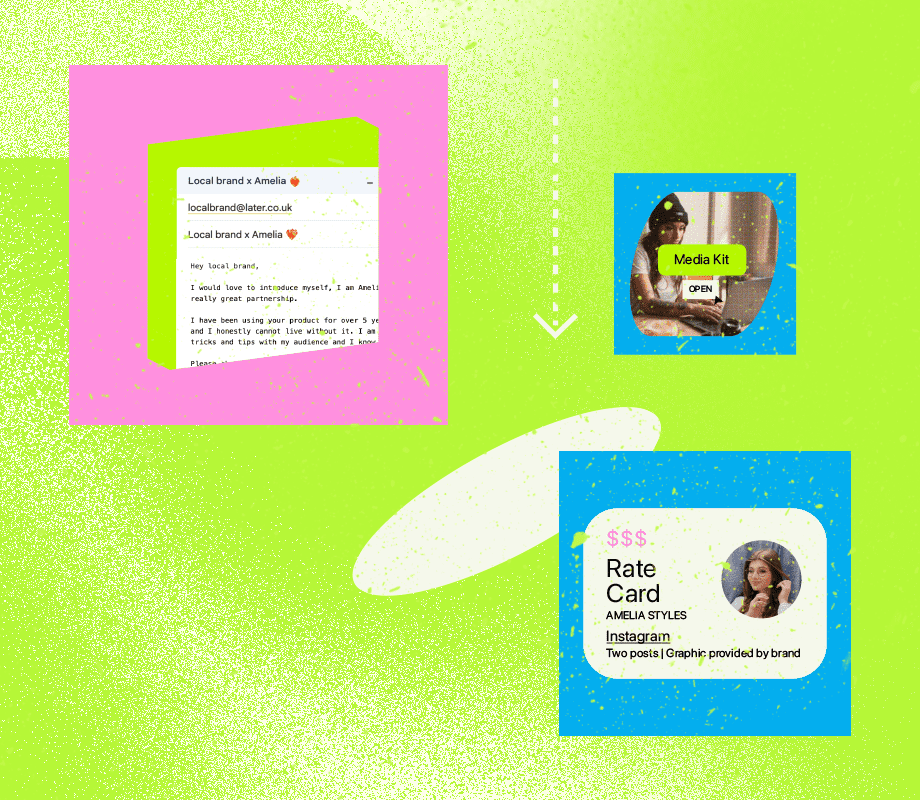When you’re working with creators, there’s one step you shouldn’t skip: setting up agreements and contracts.
A great influencer contract enables your creator partner creative freedom while making it easy for you (and the influencers you partner with) to focus on the goal at hand.
Knowing the difference between contracts and agreements is important for anyone working with influencers. Both are essential for smooth collaborations.
It’s also helpful to have an influencer contract template that includes all the key elements you need in your documentation.
Don’t worry — we’ve got you covered.
Join over 1 million marketers to get social news, trends, and tips right to your inbox!
Email AddressWhat Are Influencer Marketing Contracts?
Influencer marketing contracts are documents between a brand and an influencer that outline:
A project’s scope of work;
Payment terms;
Cancellation or termination clauses; and
Other critical administrative details that turn a mutual understanding into a working, legal partnership.
What’s the Difference Between a Contract and an Agreement?
An influencer marketing agreement describes a partnership, noting who is responsible for each task.
For example, the agreement will outline that the brand wants a campaign where the influencer co-creates a script and highlights information in their Link in Bio.
A contract describes the terms under which the work is done. For instance, a contract might include any language that is not allowed in the campaign or guidance on how to talk about competitors.
Contracts are the next step after you’ve come to a mutual understanding of core details like scope of work, content requirements, and rates. This understanding can happen verbally or via email, but a contract is always a written document that’s signed before work can begin.
Note: If you have any non-negotiable terms for your partnerships, such as exclusivity or a specific type of cancellation clause, disclose them ahead of time so there are no surprises.
Why Are Contracts & Agreements Essential for Influencer Marketing?
Contracts and agreements are beneficial for both influencers and brands alike. Here's why.
They Help Everyone Understand Their Role in the Partnership
In the world of influencer marketing, one of the most common sources of confusion is who owns each content creation step, from ideation to production and editing.
A good influencer agreement and contract will clarify every detail so everyone knows exactly what they will be responsible for. It will also detail how and when influencers get paid.
They Bring All Communication Into a Single, Referenceable Document
A contract organizes all the details you discussed or communicated, whether verbally, via email, or outlined in an influencer’s media kit.
This helps avoid miscommunications and makes clauses easy to reference. You don’t need to sift through dozens of emails or call notes. Instead, you can just check the contract.
Ongoing communication between influencers and brand partners is still important after the ink has dried and the contract has been signed! Maintaining a relationship with influencer partners ensures your campaign stays on track and allows you to build a positive business relationship.
This is where a tool like the Later Influencer Campaign Management Platform is valuable: it streamlines all influencer communications, from initial outreach to contracts, creative sign-off, and payments.
They Create a Safeguard Against Disputes
A good contract also explains details like:
Quality expectations for deliverables.
Edits, revisions, and what you can do if the final deliverable doesn’t meet your standards.
Who owns the intellectual property of each deliverable.
How the work ends, continues, or can be terminated.
A contract is important but you also want to work with influencers who partner in good faith.
That’s why it’s crucial to find the right influencers for your campaigns. Later Influence, for example, has a database of contactable influencers to make it easier to find high-quality partners.
The Essential Components of an Influencer Contract
Here are some essential components to include in your influencer contracts.
One important note: If you have particularly sensitive or complex contract requirements, don’t take risks and consult a legal professional.
1. Named Parties, Definitions, and Relationship
State everyone’s name (and business name), plus any shorthand you might use (e.g. "The Organization" and “The Influencer”).
You should also explicitly document your legal working relationship. For instance, the influencer is typically an independent contractor, rather than an employee.
2. Nature and Delivery of Services
This section explains:
How you will work together: This includes who is responsible for each step in the process and which platforms you'll use for the campaign.
Time management expectations: Outline the timeline for the deliverables, any important meetings and other dates of note.
Turnaround time expectations: Clarify when each party will return a deliverable. For example, this could include responding to edits within 48 hours.
3. Fees, Terms, and Termination
This section will state how much the influencer will be paid and how payment works. For example, the creator will send a monthly invoice for deliverables with payment due 30 days later.
It will also note how long the project is expected to last, what happens if there are late deliverables, and how each party can cancel the contract, with details like notice periods or fees.
In this section, you can also include how your company handles billable expenses. For instance, an expense will only be billable if agreed to, in writing, before incurring the expense.
4. Confidentiality, Exclusivity, and Conflicts of Interest
A reality of working with influencers is that they will have other clients and brands they work with.
You may want to include causes that ensure the influencer will:
Not take on work with a direct competitor during your campaign;
Complete the contract regardless of other work that they may receive in that time; or
Sign a non-disclosure agreement and keep all information confidential.
5. Content Ownership
Your contract must indicate what content you own versus what intellectual property the influencer retains.
Intellectual property is important, especially if you’re using influencer marketing to build a bank of content that can be reused and repurposed for future campaigns.
You’ll also want to include a clause for mutual indemnity. This means each party will pay the other for damages they cause during the project. So, for example, if you accidentally break an influencer’s camera on set, you pay for repair or replacement.
6. Non-solicitation, notice, and choice of law
Three legal concepts - non-solicitation, notice, and choice of law - are important for covering your bases when it comes to working with influencers and creators.
Non-solicitation is when both parties agree not to poach each other’s employees or contractors.
Notice defines when something is officially “delivered” and is typically an email address—once you send it there, it’s considered delivered.
Choice of law refers to the courts you'll use if needed, usually based on your location. For instance, a Los Angeles company would choose California law and file in an LA court.
7. General Comments and Independent Legal Advice
This section is for any additional clauses, which could come from negotiations or unique components that apply to your business.
It’s also the section where you include a clause where everyone agrees they’ve had the chance to seek legal advice. This helps seal the contract as it declares that everyone agrees they understand the legal details.
8. Signatures
Arguably the most crucial step is where you, as the brand, and the influencer sign the contract, making it legally binding.
Good Contracts Make Good Partnerships
A good contract is about solidifying your mutual understanding of the project so everyone can get to the good stuff — producing great content.
If you want the contract step to be easy, you need a platform that helps you manage sourcing influencers, outreach, communication, and negotiations in one place.
You’ll also want analytics after the fact, particularly if any payment or future work is based on the success of the campaign.
Book a free demo with Later Influence to learn more about how the platform makes your entire influencer management ecosystem simple.




